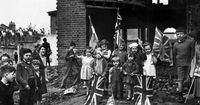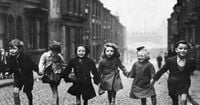As the world marks the 80th anniversary of Victory in Europe Day (VE Day), stories from those who lived through the momentous occasion in 1945 are being shared, reflecting both the joy and the sorrow that accompanied the end of World War II. On May 8, 1945, millions across Europe celebrated the unconditional surrender of German forces, marking a significant turning point after nearly six years of conflict.
In Bothenhampton, a village in west Dorset, 86-year-old Diana Hart (nee Hart) recently unearthed a photograph capturing the spirit of that day, showcasing the children’s fancy dress competition held at the old farm at the bottom of the village. Diana's family had been abroad during the war, returning only in 1944. The photo, taken on VE Day, features children from Bothenhampton and surrounding areas. Diana reminisced, "This was taken in Bothenhampton village with a backdrop of what would have been part of the farm wall." She hopes others in the photograph will reach out to share their own memories through the local news.
Meanwhile, in Woodbridge, Suffolk, 91-year-old Terry Basson recalls the exuberant celebrations in his town. Having moved there with his family to escape the Blitz in 1940, Basson vividly remembers the festivities around the Shire Hall in Market Square. "As a child, I followed the band up around Market Hill then down New Street to a chorus of loud cheers with claps of sheer happiness," he said. The celebrations included soldiers from the nearby Debach camp, who watched in amazement as the townsfolk sang songs popularized by wartime singer Vera Lynn.
Food and drink flowed freely, with Basson noting that on VE Day, "celebrations seemed to have no ending." He also recalled Winston Churchill's words broadcasted that day, reminding the nation that while they could rejoice, the fight against Japan was still ongoing.
In Liverpool, memories of childhood during the war are being captured in a new book titled Blitz Kids, which tells the stories of children who lived through the air raids and bombings. Frances Izzard, now 91, shared her experience of being evacuated to Haslington in Cheshire at the age of six. Separated from her family and living with host families, she faced hardships, including the tragic loss of five family members in the Blackstock Gardens bombing. "When we came back to Liverpool from being away, it looked completely different because of the bombing. You could see the centre of town was flat - absolutely flat," she recalled.
Frances remembers VE Day as a time of unrestrained celebration, with street parties and bonfires that seemed to last for days. "It was lovely to think there wouldn’t be any more bombs," she said, highlighting the joy that enveloped the city as people gathered to celebrate the end of a long and painful chapter.
Clare McGann, also from Liverpool, shared her harrowing experience of the Blitz when her family's flat was bombed in 1941, burying her pregnant mother under rubble. Despite the trauma, Clare recalls the VE Day party in Myrtle Gardens, where music and laughter filled the air. "We were just so happy that it was all over," she said, reflecting on the community spirit that brought everyone together that day.
Christopher Munro, now 86, grew up near the docks and remembers the dangers of living in a bomb-prone area. He, too, celebrated VE Day with street parties and music, noting the sense of relief that permeated the air. "We had loads of parties. It was fabulous. They had the pianos in the streets and everything," he said.
As communities across the UK prepared for VE Day celebrations, St Helens newspapers documented the events with great detail. The St Helens Reporter noted that the streets transformed overnight, filled with flags and bunting as residents celebrated in their own ways. The afternoon radio relay of Winston Churchill's announcement marked the beginning of the festivities, with spontaneous gatherings occurring throughout the town.
One resident noted, "A happier, more carefree crowd never gave itself up to joyous abandon since St Helens found a place on the map." The celebrations included bonfires, fireworks, and even street parties where effigies of Nazi leaders were burned, showcasing the community's relief and joy.
Despite the jubilant atmosphere, the reality of the war lingered. Many families had lost loved ones, and the scars of conflict remained. The author of a reflective piece on the anniversary emphasized, "Thousands of men didn’t return from the war," highlighting the bittersweet nature of the celebrations. The transition back to normal life was challenging for many veterans, who returned to families they barely recognized.
Josephine Waring's letter to her son, Roy, who was serving in Germany on VE Day, encapsulated the mixed emotions of the time. "I wonder what you are doing, Roy, in Germany. Are you having any celebrations for VE Day?" she wrote, acknowledging the sacrifices made by those still in the line of duty.
As the nation celebrates the 80th anniversary of VE Day, it’s a time to reflect on both the joy of liberation and the sacrifices made. Communities are encouraged to come together once more, laying tables, dancing, and sharing stories that honor the past while looking forward to a brighter future.
While the celebrations of VE Day in 1945 were a moment of joy, they also reminded the nation of the resilience and strength of those who lived through the war. The stories of Diana, Terry, Frances, Clare, and Christopher serve as a testament to the enduring spirit of a generation that faced unimaginable challenges yet emerged with a sense of hope and community.



